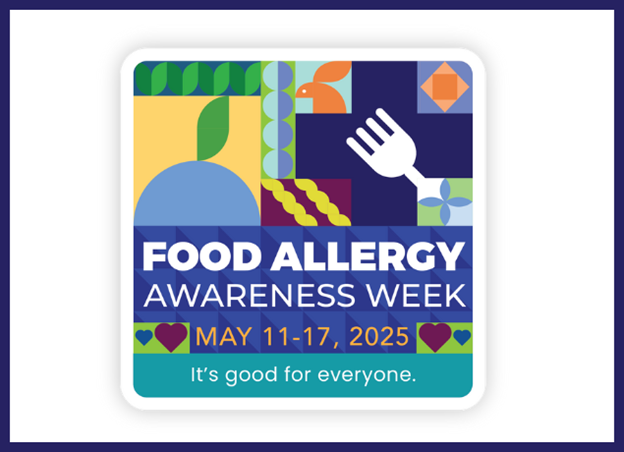
Food Allergy Awareness Week is May 11-17
Raise awareness by sharing “Food Allergy Myths and Facts”
Myth: Food allergies are not that serious.
Fact: Food allergies can be a life-threatening disease.
Myth: Eating a little bit of a food that you are allergic to won’t hurt you.
Fact: Even a trace amount of a food allergen can cause a severe reaction called anaphylaxis in some people.
The food a person is allergic to must be completely removed from their diet for them to stay safe and live well.
Myth: Each reaction will get worse and worse.
Fact: Food allergy reactions are unpredictable.
Myth: Food allergies are the same as food intolerances.
Fact: Food intolerance does not involve an immune system reaction.
Myth: If a food allergy test is positive, you have a food allergy.
Fact: Positive skin prick or blood test results for a food allergy are not always accurate and can sometimes give “false positive” results.
Myth: Peanut allergy is the most dangerous food allergy.
Fact: No single food allergy poses a greater threat than another.
Myth: A food allergy always develops in childhood.
Fact: A food allergy can occur at any age, well into adulthood.
Myth: Antihistamines will stop an allergic reaction.
Fact: Antihistamines can help relieve some symptoms like an itchy mouth or skin, but they DO NOT stop anaphylaxis.
Myth: Once you develop a food allergy, you cannot outgrow it.
Fact: It is possible to outgrow your food allergies with age.
However, allergies to peanuts, tree nuts, fish, and shellfish are less likely to be outgrown.
Myth: If you don’t have an allergic reaction within 30 minutes of being exposed to your allergen, you won’t have one.
Fact: Symptoms can start within a few seconds of eating a food allergen, but it can take up to 2 hours for symptoms to appear.
Myth: If a food doesn’t traditionally contain an allergen, or you don’t see the allergen listed in the description, it’s safe to eat.
Fact: Allergens can appear in unexpected places.
